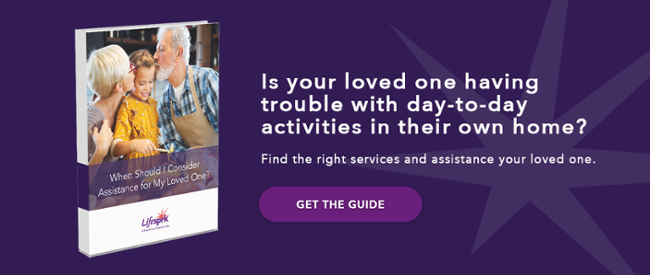
It’s easy to miss the signs that your loved one may be finding their day-to-day activities more difficult than they used to be. As your loved one ages, a decline in cognitive or physical ability often is the culprit that turns easy day-to-day activities into a struggle. Independence is most likely a priority for your loved one and it can be easy to be convinced that they are doing just fine on their own.
“Sometimes it’s a gut feeling that has adult children calling us for advice,” said Tanya Castillo, RN Case Manager for Lifesprk. “They sense something was off and they needed guidance. Even the smallest of support can make a major impact long-term when it comes to helping seniors age in place safely and independently. The first signs are often those you may not know to look for but as a nurse, we see it all the time. Addressing those little signs that are giving you a nagging feeling is important, it can often prevent a health crisis.”
While your loved one may not know what level of assistance they need, it’s important to look out for these 5 signs that might mean that it’s time your loved ones need some everyday help.
Disorganized home
If you arrive at your loved one’s home and find piles of mess and clutter, it’s time to sit down and have a conversation about how they’re managing their daily chores. For example, in the kitchen, you might find piles of dirty dishes or a fridge with expired food.
Even though your loved one may have held their immaculate garden as a top priority, you may notice it overgrown with weeds, and the general condition of the house might have declined.
These are examples of signs that your loved one needs some assistance with their everyday chores at home and aren’t managing as well as they once did.
Forgetting appointments
A key sign of cognitive decline is when someone starts to forget appointments regularly. While we all occasionally forget an important date that we have scheduled in our calendar, if your loved ones are forgetting those regularly scheduled doctor’s appointments, it’s probably time to rethink their current living situation.
You might also find that one day you show up at your loved ones’ door and they’ve completely forgotten about your visit despite the fact you scheduled it weeks ago. It is also important that you check to see if they are remembering to take any necessary medications as well.
If your loved ones are forgetting times they schedule with you, their friends, or their doctors, it’s a strong indicator that they may need assistance.
Difficulty moving
If you see your loved ones regularly, it can sometimes be difficult to pick up on the signs of gradual physical decline. It’s likely they won’t want to acknowledge any changes in their physical capability, so it will therefore fall onto you to pick up on any changes, and make sure additional assistance and support are available when needed.
Your loved one might be having difficulty getting out of bed or going up and down the stairs. Perhaps you’re used to your loved one being active and able to do the grocery shopping independently. While it can be painful to admit that your loved one is slowing down, changes in their physical ability are key indications that they need some additional assistance.
Hygiene routine
A personal hygiene routine can be a strong warning sign that your loved one isn’t managing as well as they used to, and are now in need of some additional assistance.
Look for signs that they are wearing the same clothes every day without washing them or that they’re not washing regularly. If your loved one is unable to take care of themselves properly, it’s also possible they will forget to brush their teeth or keep themselves presentable.
If it looks like your loved one is struggling to maintain basic personal hygiene routines, it’s a sure sign they need assistance with day-to-day tasks.
Mood changes
When seniors begin to need a little more assistance and support in everyday life, they may experience bouts of moodiness. Feeling like they are losing their independence can result in mood swings, anger, and feelings of hopelessness.
While visiting with your loved one, take note of their mood throughout the day. Are they happy to see you and consistent with their mood or are they irritable and snappy?
Seniors are generally very happy to see their loved ones, and this is a key factor in determining how they are coping. If they seem depressed when you visit, express very little interest in activities that they used to enjoy, or simply don’t talk as much as before, it could be a sign that they are feeling depressed.
When safety, well-being, and happiness are being compromised, it’s the right time to think about what assistance will be the right fit for your loved ones on an everyday basis. Assistance could mean in-home care, senior housing, or a retirement community – there are many options that can suit each individual and their situation.
While sometimes difficult to come to terms with, don’t ignore any of the above signs, as they could be critical warnings that your loved ones are struggling and in need of assistance.




